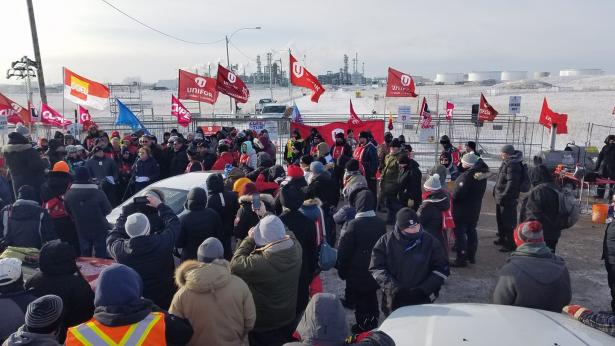In one of the most militant job actions Canada has seen in recent memory, workers at the Co-op Refinery Complex in Regina, Saskatchewan — locked out by their employer since December 5 over a contract dispute — have blockaded the 544-acre facility, preventing scabs from getting in and petroleum from getting out.
The workers are members of Unifor, the country’s largest private-sector union. Unifor Local 594 represents about 800 employees at the refinery, which is owned by Federated Co-operatives Limited (FCL) — a major company that posted a record $1.2 billion in profits in 2018. The refinery supplies petroleum products to FCL groceries, gas stations, and hardware stores across Western Canada.
Unifor and FCL hit an impasse in contract negotiations last fall. The company is trying to restructure the workers’ pensions, making each employee individually choose between either paying into the existing defined plan (which FCL has always paid into entirely) or switching to a less stable, 401(k)-style contribution plan. The union says such a change would lead to a nearly 50 percent cut in retirement benefits, after FCL previously promised not to touch pensions.
“What Federated Co-operatives is proposing is nothing short of a gutting of our pension,” Kevin Bittman, president of Unifor Local 594, told me. “Many of us simply don’t have enough working years left to save to make up the difference. A pension cut this deep will undermine the retirement security of every single member.”
On December 3, Unifor Local 594 members voted to authorize a strike. But two days later, the company locked them out and immediately began bringing in replacement workers to keep production going. Unifor says the scabs are underqualified, jeopardizing workplace safety.
The injunction limits the union’s picket activity, requiring pickets to be suspended for up to ten minutes at a time to allow the smooth transportation of replacement workers and fuel trucks. In other words, the court order completely undermines the union and strengthens the company’s position.
The workers are defying the injunction. On January 20, they installed fences around the refinery complex and initiated a blockade to shut down production. Regina police arrested fourteen picketers, including Unifor national president Jerry Dias, charging them with “mischief.”
Unifor secretary-treasurer Lana Payne accused the police of using “heavy-handed tactics aimed at inflaming tensions” and said the arrests were “completely unnecessary and on a level I have rarely witnessed in recent years.”
“I’ve never seen a police department in any city in this country behave the way the Regina police did,” Dias said after being released from custody.
Despite the arrests, and despite a judge leveling a $100,000 fine against Unifor for violating the injunction, the blockade around the refinery is continuing. Hundreds of union members from across Canada—including from the Canadian Labour Congress, Canadian Federation of Nurses Unions, and Canadian Union of Public Employees (CUPE) — have converged on Regina to join the twenty-four-hour pickets. Facing this mounting pressure, FCL’s CEO agreed to meet with union representatives on Monday for the first time since the lockout began.
“If they take away pensions in the private sector, we at the public sector know they’re coming after ours next,” CUPE president Mark Hancock recently said on the picket lines. “Our members at CUPE have very similar experiences to those at Unifor. There are some nuances, there are some differences, but at the end of the day, we’re all workers.”
“The escalation by police and the greed of the employer have been met with an unprecedented mobilization of workers,” Dias says. “It’s a defining moment for the modern Canadian labor movement.”
From the United States, the United Electrical Workers (UE) issued a solidarity statement, condemning the actions of local police, and sent a small delegation to Regina last week. Since signing a cooperation agreement to promote cross-border labor solidarity in 2017, UE and Unifor have been close allies. Through their North American Solidarity Project, the unions are striving to build “a continental labor alliance based upon democratic and militant social unionism.”
Unifor’s blockade of the Regina refinery provides an important example of what such a democratic, militant, and solidarity-based unionism can look like. Facing a hostile employer and state, the union and its members are using their collective power and taking bold risks rather than playing it safe.
While the goal is strictly to safeguard pensions, the workers are also demonstrating organized labor’s power to bring the production and distribution of fossil fuels to a halt — the type of action that may need to continue happening, on a larger scale and in a more coordinated way, in order to force the kind of systemic changes needed to end the climate crisis.
The US labor movement should take note of what is happening in Regina — and get behind the workers of Unifor Local 594.
Jeff Schuhrke is a PhD candidate in history at the University of Illinois at Chicago. He is a steward and former co-president of the UIC Graduate Employees Organization, AFT Local 6297.


Spread the word